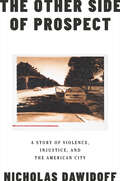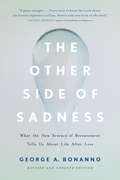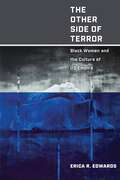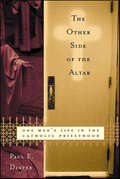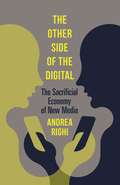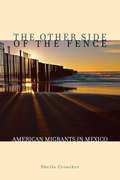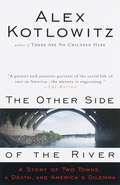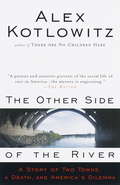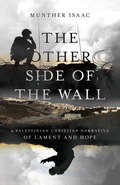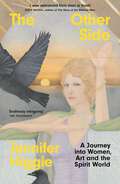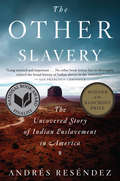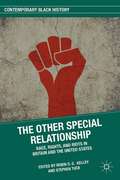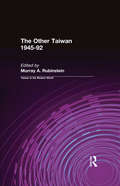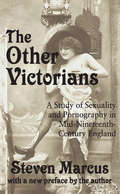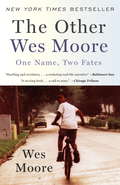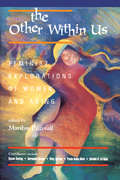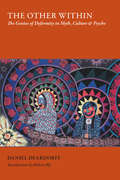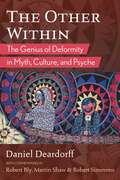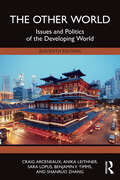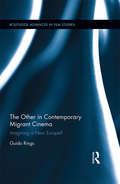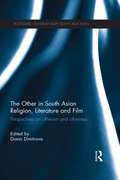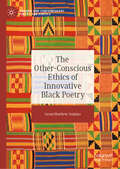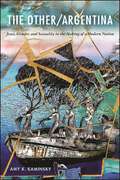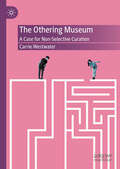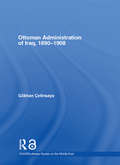- Table View
- List View
The Other Side of Prospect: A Story Of Violence, Injustice, and the american city
by Nicholas DawidoffOne of Literary Hub's Most Anticipated Books of 2022 A landmark work of intimate reporting on inequality, race, class, and violence, told through a murder and intersecting lives in an iconic American neighborhood. One New Haven summer evening in 2006, a retired grandfather was shot point-blank by a young stranger. A hasty police investigation culminated in innocent sixteen-year-old Bobby being sentenced to prison for thirty-eight years. New Haven native and acclaimed author Nicholas Dawidoff returned home and spent eight years reporting the deeper story of this injustice, and what it reveals about the enduring legacies of social and economic disparity. In The Other Side of Prospect, he has produced an immersive portrait of a seminal community in an old American city now beset by division and gun violence. Tracing the histories of three people whose lives meet in tragedy—victim Pete Fields, likely murderer Major, and Bobby—Dawidoff indelibly describes optimistic families coming north from South Carolina as part of the Great Migration, for the promise of opportunity and upward mobility, and the harrowing costs of deindustrialization and neglect. Foremost are the unique challenges confronted by children like Major and Bobby coming of age in their “forgotten” neighborhood, steps from Yale University. After years in prison, with the help of a true-believing lawyer, Bobby is finally set free. His subsequent struggles with the memories of prison, and his heartbreaking efforts to reconnect with family and community, exemplify the challenges the formerly incarcerated face upon reentry into society and, writes Reginald Dwayne Betts, make this “the best book about the crisis of incarceration in America.” The Other Side of Prospect is a reportorial tour de force, at once a sweeping account of how the injustices of racism and inequality reverberate through the generations, and a beautifully written portrait of American city life, told through a group of unforgettable people and their intertwined experiences.
The Other Side of Sadness: What the New Science of Bereavement Tells Us About Life After Loss
by George A. BonannoIn this thoroughly revised and updated classic, a renowned psychologist shows that mourning is far from predictable, and all of us share a surprising ability to be resilientThe conventional view of grieving--encapsulated by the famous five stages of grief: denial, anger, bargaining, depression, and acceptance--is defined by a mourning process that we can only hope to accept and endure. In The Other Side of Sadness, psychologist and emotions expert George Bonanno argues otherwise. Our inborn emotions--anger and denial, but also relief and joy--help us deal effectively with loss. To expect or require only grief-stricken behavior from the bereaved does them harm. In fact, grieving goes beyond mere sadness, and it can actually deepen interpersonal connections and even lead to a new sense of meaning in life.
The Other Side of Terror: Black Women and the Culture of US Empire
by Erica R. EdwardsWINNER, 2022 John Hope Franklin Prize, given by the American Studies Association HONORABLE MENTION, 2022 Gloria E. Anzaldúa Book Prize, given by the National Women's Studies AssociationReveals the troubling intimacy between Black women and the making of US global powerThe year 1968 marked both the height of the worldwide Black liberation struggle and a turning point for the global reach of American power, which was built on the counterinsurgency honed on Black and other oppressed populations at home. The next five decades saw the consolidation of the culture of the American empire through what Erica R. Edwards calls the “imperial grammars of blackness.”This is a story of state power at its most devious and most absurd, and, at the same time, a literary history of Black feminist radicalism at its most trenchant. Edwards reveals how the long war on terror, beginning with the late–Cold War campaign against organizations like the Black Panther Party for Self-Defense and the Black Liberation Army, has relied on the labor and the fantasies of Black women to justify the imperial spread of capitalism. Black feminist writers not only understood that this would demand a shift in racial gendered power, but crafted ways of surviving it. The Other Side of Terror offers an interdisciplinary Black feminist analysis of militarism, security, policing, diversity, representation, intersectionality, and resistance, while discussing a wide array of literary and cultural texts, from the unpublished work of Black radical feminist June Jordan to the memoirs of Condoleezza Rice to the television series Scandal. With clear, moving prose, Edwards chronicles Black feminist organizing and writing on “the other side of terror”, which tracked changes in racial power, transformed African American literature and Black studies, and predicted the crises of our current era with unsettling accuracy.
The Other Side of the Altar: One Man's Life in the Catholic Priesthood
by Paul E. DinterIn all the coverage of the priestly sexual abuse scandal in the Catholic Church, one story has been left untold: the story of the everyday lives of Catholic priests in America, which remain so little understood as to be a secret, even as one priestly sexual predation after another has come to light.In The Other Side of the Altar, Paul Dinter tells one priest's story--his own--in such a way as to reveal the lives of a generation of priests that spanned two very different eras. These priests entered the ministry in the 1960s, when Catholic seminaries were full of young men inspired by both the Church's ancient faith and the Second Vatican Council's promises of renewal. But by the early 1970s, the priesthood--and the celibate fraternity it depended upon--proved quite different from what the Council had promised. American society had changed, too, particularly in the area of sexuality. As a result, there emerged a clerical subculture of denial and duplicity, which all but guaranteed that the sexual abuse of children by priests would be routinely covered up by the Church's bishops.Dinter, now married and raising two stepdaughters, left the priesthood in 1994 over the issue of celibacy, but not before having occasion to reflect on the whole range of priestly struggles with celibacy and sexual life in general--in Rome and rural England, on an Ivy League campus, and in parish rectories of the archdiocese of New York. His candid and affecting account--written from the other side of the altar, so to speak--makes clear that celibacy, sexuality, and power among the clergy have long been intertwined, and suggests how much must change if the Catholic Church hopes to regain the trust of its people.
The Other Side of the Digital: The Sacrificial Economy of New Media
by Andrea RighiA necessary, rich new examination of how the wired world affects our humanity Our tech-fueled economy is often touted as a boon for the development of our fullest human potential. But as our interactions are increasingly turned into mountains of data sifted by algorithms, what impact does this infinite accumulation and circulation of information really have on us? What are the hidden mechanisms that drive our continuous engagement with the digital?In The Other Side of the Digital, Andrea Righi argues that the Other of the digital acts as a new secular God, exerting its power through endless accountability that forces us to sacrifice ourselves for the digital. Righi deconstructs the contradictions inherent in our digital world, examining how ideas of knowledge, desire, writing, temporality, and the woman are being reconfigured by our sacrificial economy. His analyses include how both our self-image and our perception of reality are skewed by technologies like fitness bands, matchmaking apps, and search engines, among others.The Other Side of the Digital provides a necessary, in-depth cultural analysis of how the political theology of the new media functions under neoliberalism. Drawing on the work of well-known thinkers like Jacques Derrida, Jacques Lacan, and Ludwig Wittgenstein, as well as Carla Lonzi, Luisa Muraro, and Luciano Parinetto, Righi creates novel appraisals of popular digital tools that we now use routinely to process life experiences. Asking why we must sign up for this sort of regime, The Other Side of the Digital is an important wake-up call to a world deeply entangled with the digital.
The Other Side of the Fence
by Sheila CroucherA growing number of Americans, many of them retirees, are migrating to Mexico's beach resorts, border towns, and picturesque heartland. While considerable attention has been paid to Mexicans who immigrate to the U. S. , the reverse scenario receives little scrutiny. Shifting the traditional lens of North American migration, The Other Side of the Fence takes a fascinating look at a demographic trend that presents significant implications for the United States and Mexico. The first in-depth account of this trend, Sheila Croucher's study describes the cultural, economic, and political lives of these migrants of privilege. Focusing primarily on two towns, San Miguel de Allende in the mountains and Ajijic along the shores of Lake Chapala, Croucher depicts the surprising similarities between immigrant populations on both sides of the border. Few Americans living in Mexico are fluent in the language of their new land, and most continue to practice the culture and celebrate the national holidays of their homeland, maintaining close political, economic, and social ties to the United States while making political demands on Mexico, where they reside. Accessible, timely, and brimming with eye-opening, often ironic, findings, The Other Side of the Fence brings an important perspective to borderlands debates.
The Other Side of the River: A Story of Two Towns, a Death and America's Dilemma
by Alex KotlowitzIn The Other Side of the River, Kotlowitz takes us to southern Michigan. Here, separated by the St. Joseph River, are two towns, St. Joseph and Benton Harbor. Geographically close, they are worlds apart, a living metaphor for America's racial divisions: St. Joseph is a prosperous lake shore community and ninety-five percent white, while Benton Harbor is impoverished and ninety-two percent black. When the body of a black teenaged boy from Benton Harbor is found in the river, unhealed wounds and suspicions between the two towns' populations surface as well. The investigation into the young man's death becomes, inevitably, a screen on which each town projects their resentments and fears. The Other Side of the River sensitively portrays the lives and hopes of the towns' citizens as they wrestle with this mystery--and reveals the attitudes and misperceptions that undermine race relations throughout America. In this gripping and ultimately profound book, Alex Kotlowitz proves why he is one of this country's foremost writers on the ever explosive issue of race.
The Other Side of the River: A Story of Two Towns, a Death, and America's Dilemma
by Alex Kotlowitz<P>Alex Kotlowitz's There Are No Children Here was more than a bestseller; it was a national event. <P>His beautifully narrated, heartbreaking nonfiction account of two black boys struggling to grow up in a Chicago public housing complex spent eight weeks on The New York Times bestseller list, was a made-for-television movie starring and produced by Oprah Winfrey, won many distinguished awards, and sparked a continuing national debate on the lives of inner-city children. <P>In The Other Side of the River, his eagerly awaited new book, Kotlowitz takes us to southern Michigan. Here, separated by the St. Joseph River, are two towns, St. Joseph and Benton Harbor. Geographically close, they are worlds apart, a living metaphor for America's racial divisions: St. Joseph is a prosperous lakeshore community and ninety-five percent white, while Benton Harbor is impoverished and ninety-two percent black. <P>When the body of a black teenaged boy from Benton Harbor is found in the river, unhealed wounds and suspicions between the two towns' populations surface as well. The investigation into the young man's death becomes, inevitably, a screen on which each town projects their resentments and fears. <P> The Other Side of the River sensitively portrays the lives and hopes of the towns' citizens as they wrestle with this mystery--and reveals the attitudes and misperceptions that undermine race relations throughout America. <P>In this gripping and ultimately profound book, Alex Kotlowitz proves why he is one of this country's foremost writers on the ever explosive issue of race. From the Hardcover edition.
The Other Side of the Wall: A Palestinian Christian Narrative of Lament and Hope
by Munther IsaacChristians have lived in Palestine since the earliest days of the Jesus movement.
The Other Side: A Journey into Women, Art and the Spirit World
by Jennifer Higgie'Endlessly intriguing . . . I was enchanted' - DAILY TELEGRAPH'Illuminating in every sense of the word' - John HiggsIn an illuminating blend of memoir and art history, The Other Side explores the lives and work of a group of extraordinary women artists. From the twelfth-century mystic Hildegard of Bingen and the nineteenth-century spiritualist Georgiana Houghton to the pioneering Hilma af Klint, these women all - in their own unique ways - shared the same goal: to communicate with, and learn from, other dimensions. Weaving in and out of their myriad lives, Jennifer Higgie considers the solace of ritual, the gender exclusions of art history, the contemporary relevance of myth, the boom in alternative ways of understanding the world and the impact of spiritualism on feminism and contemporary art.
The Other Slavery: The Uncovered Story of Indian Enslavement in America
by Andrés ReséndezA landmark history — the sweeping story of the enslavement of tens of thousands of Indians across America, from the time of the conquistadors up to the early 20th century<P><P> Since the time of Columbus, Indian slavery was illegal in much of the American continent. Yet, as Andrés Reséndez illuminates in his myth-shattering The Other Slavery, it was practiced for centuries as an open secret. There was no abolitionist movement to protect the tens of thousands of natives who were kidnapped and enslaved by the conquistadors, then forced to descend into the “mouth of hell” of eighteenth-century silver mines or, later, made to serve as domestics for Mormon settlers and rich Anglos. <P> Reséndez builds the incisive case that it was mass slavery, more than epidemics, that decimated Indian populations across North America. New evidence, including testimonies of courageous priests, rapacious merchants, Indian captives, and Anglo colonists, sheds light too on Indian enslavement of other Indians — as what started as a European business passed into the hands of indigenous operators and spread like wildfire across vast tracts of the American Southwest. <P> The Other Slavery reveals nothing less than a key missing piece of American history. For over two centuries we have fought over, abolished, and tried to come to grips with African-American slavery. It is time for the West to confront an entirely separate, equally devastating enslavement we have long failed truly to see.
The Other Special Relationship
by Robin D. G. Kelley Stephen TuckThe close diplomatic, economic, and military ties that comprising the "special relationship" between the United States and Great Britain have received plenty of attention from historians over the years. Less frequently noted are the countries' shared experiences of empire, white supremacy, racial inequality, and neoliberalism - and the attendant struggles for civil rights and political reform that have marked their recent history. This state-of-the-field collection traces the contours of this other "special relationship," exploring its implications for our understanding of the development of an internationally interconnected civil rights movement. Here, scholars from a range of research fields contribute essays on a wide variety of themes, from solidarity protests to calypso culture to white supremacy.
The Other Taiwan, 1945-92 (Taiwan In The Modern World Ser.)
by Murray A. RubinsteinExamines the effects of the socio-economic post-war transformation on Taiwan's political system, environment, religious structures, the relationships between the sexes and the different ethnic populations. A complex revisionist portrait of the country emerges.
The Other Victorians: A Study of Sexuality and Pornography in Mid-nineteenth-century England
by Steven MarcusTaking as his point of departure the authors, the audience, and the texts of Victorian writings on sex in general and of Victorian pornography in particular, Steven Marcus offers a startling and revolutionary perspective on the underside of Victorian culture. The subjects dealt with in The Other Victorians are not only those to have been "shocking" in the Victorian period. The way these subjects were regarded--and the way our notions of the Victorians continue to change, as the efforts of contemporary scholarship restore them to their full historical dimensions--are matters today of some surprise and wonder.Making use, for the first time, of the extensive collection of Victoriana at the Kinsey Institute for Sex Research, Marcus first examines the writings of Dr. William Acton, who may be said to represent the "official views" of sexuality held by Victorian society, and of Henry Spencer Ashbee, the first and most important bibliographer-scholar of pornography. He then turns to the most significant work of its kind from the period, the eleven-volume anonymous autobiography My Secret Life. There follows an analysis of four pornographic Victorian novels--an analysis that throws an oblique but fascinating light on the classics of Victorian literature--and a review of the odd flood of Victorian publications devoted to flagellation. The book concludes with a chapter propounding a general theory of pornography as a sociological phenomenon.With the publication of The Other Victorians, understanding of this period took a giant stride forward. Most of the writers and writings discussed by Marcus belong to Victorian sub-literature rather than to literature proper; in this way the work remains connected to a consideration of the exotic sub-literature. A brilliantly written book in its own right, this work transformed the study of the Victorian period as did no other.
The Other Wes Moore: One Name, Two Fates
by Wes MooreThe chilling truth is that his story could have been mine. The tragedy is that my story could have been his.<P><P> Two kids named Wes Moore were born blocks apart within a year of each other. Both grew up fatherless in similar Baltimore neighborhoods and had difficult childhoods; both hung out on street corners with their crews; both ran into trouble with the police. How, then, did one grow up to be a Rhodes Scholar, decorated veteran, White House Fellow, and business leader, while the other ended up a convicted murderer serving a life sentence? Wes Moore, the author of this fascinating book, sets out to answer this profound question. In alternating narratives that take readers from heart-wrenching losses to moments of surprising redemption, The Other Wes Moore tells the story of a generation of boys trying to find their way in a hostile world.<P> BONUS: This edition contains a new afterword and a The Other Wes Moore discussion guide.
The Other Within Us: Feminist Explorations Of Women And Aging
by Marilyn PearsallFeminist women bequeath to us a powerful critique of our society's obsession with beauty and impossible body ideals. Having refused makeup, high heels, and short skirts in their youth, these women are now entering the most stigmatized stage in a woman's life?old age. As she becomes the ?older woman,? the feminist's rejection of beauty standards and her ability to locate self-worth is being challenged.How will feminists respond to the issues raised in this phase of their lives? By confronting the issues unique to older women in our culture and society, these authors redress the neglect and isolation experienced within contemporary feminism and gerontology.Ultimately, the goal of the book is to inspire the aging woman to more easily embrace the ?older other? within her.
The Other Within: The Genius of Deformity in Myth, Culture, and Psyche
by Robert Bly Daniel DeardorffDaniel Deardorff knows otherness firsthand. This highly regarded “singer” in the old sense of that word—musician, storyteller, maker of ritual—had polio as an infant and has used a wheelchair most of his life, giving him a lived perspective that deeply informs his views on this subject. In The Other Within, Deardorff starts with a radical notion: to disclose the blessings of outsiderhood, the many gifts and insights contributed to culture by the marginalized and outcast. Unlike studies that stress the plight of the outsider, this one asserts that to be cast down and out of the consensus-worldview affords a difficult yet significant opportunity: to encounter oneself, not as defined by society but as one actually is. An eloquent spokesman for “the man or woman on the weird road,” Deardorff presents dozens of powerful examples from myth and literature to illustrate his message in a richly allusive, complex series of essays. Drawing on the work of mythologians, poets, psychologists, and scholars, The Other Within takes readers on an initiatory journey, uncovering the roots of human identity and imagination and offering insights–including “trickster wisdom”—revealing the mythic underpinnings of everyday life. This second edition includes updated text, a new introduction, and a helpful glossary.
The Other Within: The Genius of Deformity in Myth, Culture, and Psyche
by Daniel Deardorff• Shows how myths contain medicine to restore wholeness amidst trauma, exile, sudden life change, disability, illness, death, or grief• Synthesizes lessons from shamanic practice, quantum physics, alchemy, soul poetry, wildness, social justice, and the author&’s lived experience• Discloses the blessings of outsiderhood and the gifts and insights gained and contributed to culture by those who are marginalized and outcastThere is an &“other&” that lives within each of us, an exiled part that carries wisdom needed for ourselves and the culture at large. Having survived disabling polio as an infant, Daniel Deardorff knows the oppressions of exclusion and outsiderhood. He guides readers on an initiatory journey through ancient myth, literature, and personal revelation to discover our own true identity. These 10,000-year-old stories contain sacred medicine with insights that release imagination and restore wholeness amid trauma, exile, climate chaos, disability, illness, death, and grief. Illustrating how archetypal figures of the Other--the Trickster, Daimon, Not-I, etc.--hold paradox, Deardorff teaches us to reframe disparities of self/other, civilization/ wilderness, form/deformity and transform the experience of being outcast. Synthesizing lessons from shamanic practice, quantum physics, alchemy, social justice, and his own lived experience, Deardorff affirms the disruptive and transgressive forces that break through dogma, conventionality, and prejudice. He discloses blessings of outsiderhood and gifts to culture by those who are marginalized. Through mythmaking (mythopoesis), the experience of Otherness--cultural, racial, religious, sexual, physiognomic--becomes one of empowerment, a catalyst for human liberation.
The Other World: Issues and Politics of the Developing World
by Anika Leithner Benjamin F. Timms Craig Arceneaux Sara Lopus Shanruo ZhangNow in its eleventh edition, The Other World combines thematic and area studies approaches to explore contemporary global issues. Accessible and interdisciplinary, this textbook offers political, economic, social, and historical analyses of Latin America, Sub-Saharan Africa, North Africa and the Middle East, and Asia. The Other World highlights similarities and differences as it recognizes the challenges and opportunities offered by globalization.New to the eleventh edition: A new co-author, Sara Lopus, whose academic training at the intersection of social, agricultural, and environmental problems enhances the interdisciplinary appeal of the book. A new concluding chapter on Other World features in Western countries and postcolonialism. Revamped sections on “Perspectives on Globalization,” with cases on creative responses to sustainability, sovereignty, and cultural change issues. Discussion of new topics including cybersecurity and cyberwarfare, the impact of supply chain bottlenecks, food politics and issues of global obesity, the rise of zoonotic diseases and pandemics such as Covid-19, new regional diplomacy in Middle East, protest and political change in Latin America, refugee flows, the emergence of ageing populations, and many more. The Other World is the perfect introductory text to the world’s developing regions and their political challenges – a must buy for courses in comparative politics, politics of the developing world; and introduction to international studies.
The Other in Contemporary Migrant Cinema: Imagining a New Europe? (Routledge Advances in Film Studies #46)
by Guido RingsAs a rapidly aging continent, Europe increasingly depends on the successful integration of migrants. Unfortunately, contemporary political and media discourses observe and frequently also support the development of nationalist, eurosceptic and xenophobic reactions to immigration and growing multiethnicity. Confronting this trend, European cinema has developed and disseminated new transcultural and postcolonial alternatives that might help to improve integration and community cohesion in Europe, and this book investigates these alternatives in order to identify examples of good practices that can enhance European stability. While the cinematic spectrum is as wide and open as most notions of Europeanness, the films examined share a fundamental interest in the Other. In this qualitative film analysis approach, particular consideration is given to British, French, German, and Spanish productions, and a comparison of multiethnic conviviality in Chicano cinema.
The Other in South Asian Religion, Literature and Film: Perspectives on Otherism and Otherness (Routledge Contemporary South Asia Series)
by Diana DimitrovaThis book introduces the term "otherism" and looks at the discourse of otherism and the issue of otherness in South Asian religion, literature and film. It examines cultural questions related to the human condition of being the "other," of the process of "othering" and of the representation of "otherness" and its religious, cultural and ideological implications. The book applies the perspectives of ideological criticism, theories of hybridity, orientalism, nationalism, and gender and queer studies to gain new insights into the literature, film and culture of South Asia. It looks at the different ways of interpreting "otherness" today. The book goes on to analyze the ideological implications of the creation of "otherness" with regard to religious and cultural identity and the legitimation of power, as well as how the representation of "otherness" reflects the power structures of contemporary societies in South Asia. Offering a well-thought-out reflection on important cultural questions as well as a deep insight into the study of religion and "otherness" in South Asian literature and film, this book is a pioneering project that is of interest to scholars of South Asian Studies and South Asian religions, literatures and cultures.
The Other-Conscious Ethics of Innovative Black Poetry (Modern and Contemporary Poetry and Poetics)
by Grant Matthew JenkinsThis monograph identifies and investigates the ‘other-conscious’ ethics in black avant-garde poetry since the 1980s. Drawing on a long tradition in the African Diaspora of ethical writings that put the Other first, this work shows how black poets writing in an avant garde or experimental vein in the United States push language to its limits to reveal how poetry can address and exemplify ethical postures towards other people. This other-centered vantage allows the poets to incisively comment on some of this period’s most pressing ethical issues, including postcolonial and racialized violence, the history of slavery and segregation in America, and the expansion of human consciousness. The writers involved in this study include Nathaniel Mackey, Erica Hunt, Will Alexander, Harryette Mullen, and Mark McMorris.
The Other/Argentina: Jews, Gender, and Sexuality in the Making of a Modern Nation (SUNY Press Open Access)
by Amy K. KaminskyThe Other/Argentina looks at literature, film, and the visual arts to examine the threads of Jewishness that create patterns of meaning within the fabric of Argentine self-representation. A multiethnic yet deeply Roman Catholic country, Argentina has worked mightily to fashion itself as a modern nation. In so doing, it has grappled with the paradox of Jewishness, emblematic both of modernity and of the lingering traces of the premodern. By the same token, Jewishness is woven into, but also other to, Argentineity. Consequently, books, movies, and art that reflect on Jewishness play a significant role in shaping Argentina's cultural landscape. In the process they necessarily inscribe, and sometimes confound, norms of gender and sexuality.Just as Jewishness seeps into Argentina, Argentina's history, politics, and culture mark Jewishness and alter its meaning. The feminized body of the Jewish male, for example, is deeply rooted in Western tradition; but the stigmatized body of the Jewish prostitute and the lacerated body of the Jewish torture victim acquire particular significance in Argentina. Furthermore, Argentina's iconic Jewish figures include not only the peddler and the scholar, but also the Jewish gaucho and the urban mobster, troubling conventional readings of Jewish masculinity.As it searches for threads of Jewishness, richly imbued with the complexities of gender and sexuality, The Other/Argentina explores the patterns those threads weave, however overtly or subtly, into the fabric of Argentine national meaning, especially at such critical moments in Argentine history as the period of massive state-sponsored immigration, the rise of labor and anarchist movements, the Perón era, and the 1976–83 dictatorship. In arguing that Jewishness is an essential element of Argentina's self-fashioning as a modern nation, the book shifts the focus in Latin American Jewish studies from Jewish identity to the meaning of Jewishness for the nation.This book is freely available in an open access edition thanks to the National Endowment for the Humanities Fellowships Open Book Program—a limited competition designed to make outstanding humanities books available to a wide audience. Learn more at the Fellowships Open Book Program website at: https://www.neh.gov/grants/odh/FOBP, and access the book online at the SUNY Open Access Repository at http://hdl.handle.net/20.500.12648/1711.
The Othering Museum: A Case for Non-Selective Curation
by Carrie WestwaterThe term “othering” refers to a persistent Us and Them dynamic between museums and their participating public. To reframe this historically paternalistic subject-positioning, over the last decade or so many museums have made firm attempts to address this by attempting to move from being “providers” of engagements to facilitating access to cultural right by embedding co-curatorial techniques and participation. Through the analysis of three co-curated participatory case studies, this book examines how power performs in co-curatorial museum practice. It discusses how it is not just how the participatory process is enacted that is necessary to create this shift to a more socially just profile, but systemic pressures of vulnerability and responsibility found in the political economy of the museum and its participants. This book will chart how this dynamic performs in museums when working with different groups of people, such as volunteers, community participants, and professional artists, presented with differing levels of co-curatorial decision making. The book further investigates whether performances of power are relational to who the participants are, how the processes of participation are constructed, and where the participation takes place, what language is used when conducting these relationships and what the funded institutional responsibilities do to the co-curators (the community and museum staff) when traditional co-curation and co-curation in transition to non-selective curation is applied. Grounding this discussion is the development of this test method of non-selective curation which further illuminates some of these challenges and aims to successfully mitigate them through a radically open and inclusive approach to co-curation.
The Ottoman Administration of Iraq, 1890-1908 (SOAS/Routledge Studies on the Middle East)
by Gökhan ÇetinsayaThis is a study of the nature of Ottoman administration under Sultan Abdulhamid and the effects of this on the three provinces that were to form the modern state of Iraq. The author provides a general commentary on the late Ottoman provincial administration and a comprehensive picture of the nature of its interaction with provincial society. In drawing on sources of the Ottoman archives, bringing together and analyzing an abundance of complex documents, this book is a fascinating contribution to the field of Middle Eastern studies.
